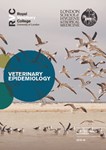Search - All Results
341 - 350 of 535 results
-
Misbehaving dogs die young
New pioneering research conducted by the VetCompass™ Programme at the Royal Veterinary College (RVC) reveals that dogs with undesirable behaviours, such as aggression, running away, fighting, over-excitability or barking, are more likely to die at a younger age. Undesirable behaviours may reflect poor training by owners or even undiagnosed medical conditions, for example dogs that urinate indoors may be suffering from unidentified bladder infections. -
RVC breakthrough in the global effort to eradicate PPR virus
RVC Researchers have made a significant breakthrough in examining the spread of Peste des Petits Ruminants (PPR), an animal disease targeted for global eradication. They found that repeated vaccination campaigns targeting production systems acting as viral reservoirs would be the most effective way of eradicating the disease.Researchers have made a significant breakthrough in examining the spread of Peste des Petits …
-
RVC agrees international affiliation with the University of Nicosia
The Royal Veterinary College (RVC) and the University of Nicosia have announced they will be working to deliver two new bachelor degrees in Veterinary Medicine in Cyprus. This new initiative aims to create Cyprus’ first veterinary school. The … -
World first, RVC finds cognitive impairments in dogs with epilepsy
A series of pioneering research studies from the Royal Veterinary College (RVC) into dogs with epilepsy have revealed that: Dogs with epilepsy find it harder to obey commands, are slower to learn new tricks, have spatial memory deficits and are easily distracted. Aversive training methods, such as bark-activated collars, prong collars and verbal punishment are associated with poor trainability and their use should be avoided. Some anti-epileptic drugs (the medications commonly used to treat seizures) were found to worsen the cognitive impairment of dogs with epilepsy. Dogs with greater exposure to training activities, including obedience classes, agility, and gun-dog training, were found to be associated with higher trainability and have fewer signs of cognitive dysfunction.You can’t teach epileptic dogs new tricks? A series of pioneering research studies from the Royal …
-
Professor Joanne Webster is finalist in the prestigious BBSRC Innovator of the Year Awards 2018
Joanne Webster, Professor of Parasitic Diseases at the Royal Veterinary College, has received the significant honour of being one of three finalists in the International Impact category of the prestigious BBSRC Innovator of the Year Award 2018. -
Scientists use modern species to discover genome structure of dinosaurs
A team of leading researchers have determined the genome structure of some of the world’s most popular dinosaurs (including the Velociraptor and the T-Rex), using ground-breaking new biotechnological research methods. -
International Canine Health Award for RVC PhD Student for canine diabetes genetic research
Alice Denyer, a PhD student from the Royal Veterinary College, has won an International Canine Health Award - the 2018 Postgraduate Student Inspiration Award. This is in recognition of her research into the genetic differences between individual dog … -
Old dogs are now teaching us new tricks
Research conducted by the RVC has identified that the emotional and physical connection between dogs and their owners is even more powerful than previously understood. -
Commonwealth Scholarship scheme allocates two prestigious scholarships to the RVC's MSc in Veterinary Epidemiology
Two Commonwealth Shared scholarships are to be awarded exclusively to candidates on the MSc in Veterinary Epidemiology course, for study beginning in the academic year 2018/19. -
Hopes to improve practise after first systematic review of the effectiveness and safety of anti-epileptic drugs in cats
Researchers from Ghent University (UGhent), Austria Veterinary Medicine School (Austria VetMed) and the Royal Veterinary College (RVC) have found that testing anti-epileptic drugs’ effectiveness and safety for cats has been generally subpar, worse than what was formerly reported in dogs.Researchers from Ghent University (UGhent), Austria Veterinary Medicine School (Austria VetMed) and …







%20Alice%20Denyer.jpg?v=638497412999710772)


.jpg?v=638497412984389645)